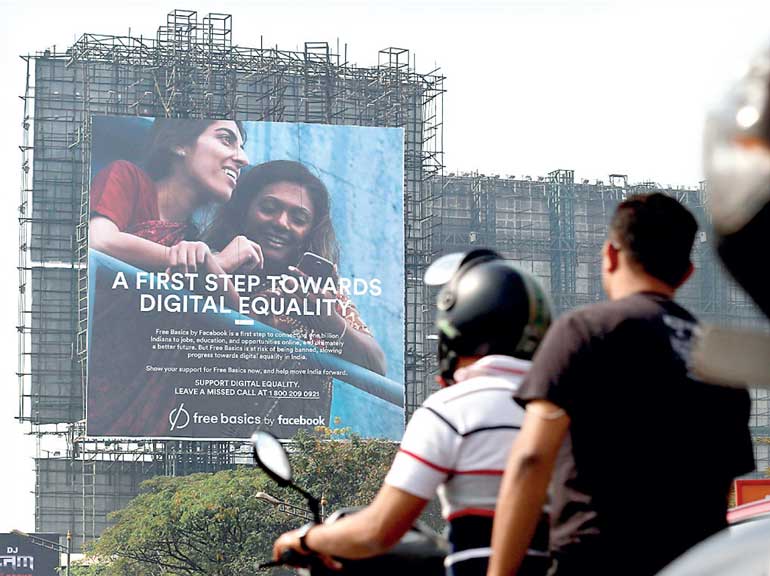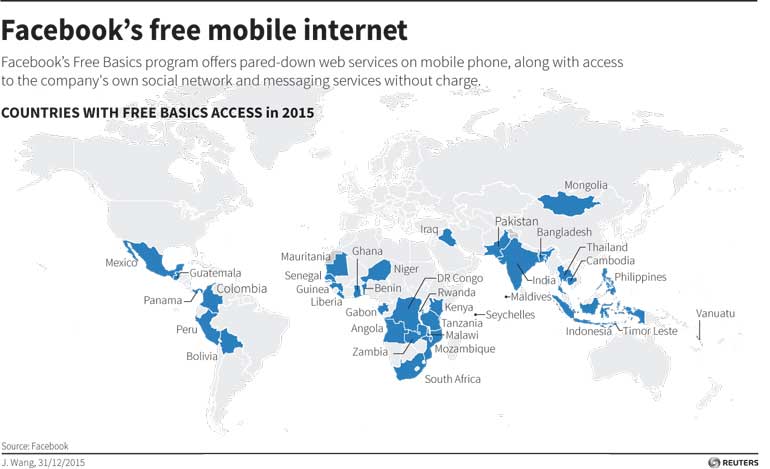Monday Feb 16, 2026
Monday Feb 16, 2026
Friday, 1 January 2016 00:00 - - {{hitsCtrl.values.hits}}


Reuters: India has become a battleground over the right to unrestricted Internet access, with local tech start-ups joining the front line against Facebook Inc founder Mark Zuckerberg and his plan to roll out free Internet to the country’s masses.
The Indian government has ordered Facebook’s Free Basics plan on hold while it decides what to do.
The program, launched in more than 35 developing countries around the world, offers pared-down web services on mobile phones, along with access to the company’s own social network and messaging services, without charge.
But critics say the program, launched 10 months ago in India in collaboration with mobile operator Reliance Communications, violates principles of net neutrality; the concept that all websites on the internet are treated equally. It would put small content providers and start-ups that don’t participate in it at a disadvantage, they say.
“India is a test case for a company like Facebook and what happens here will affect the roll out of this service in other smaller countries where perhaps there is not so much awareness at present,” said Mishi Choudhary, a New York-based lawyer who works on technology and Internet advocacy issues.
Also at stake is Facebook’s ambition to expand in its largest market outside the United States. Only 252 million out of India’s 1.3 billion people have Internet access, making it a growth market for firms including Google and Facebook.
In a letter seen by Reuters, the heads of nine start-up including Paytm, backed by China’s Alibaba Group (BABA.N), and dining app Zomato, have written to the watchdog Telecom Regulatory Authority of India (TRAI) urging it to ensure Internet access was allowed without differential pricing.
The executives said in the letter, dated Tuesday, that differential pricing for Internet access would lead to a ‘few players like Facebook with its Free Basics platform acting as gate-keepers’.
“There is no reason to create a digital divide by offering a walled garden of limited services in the name of providing access to the poor,” they wrote.
Zuckerberg has got personally involved.
“We know that for every 10 people connected to the Internet, roughly one is lifted out of poverty,” he wrote in The Times of India newspaper this week. “We know that for India to make progress, more than 1 billion people need to be connected to the Internet.
“What reason is there for denying people free access to vital services for communication, education, healthcare, employment, farming and women’s rights?”
Both sides
A company spokesman said the aim of Facebook’s Free Basics initiative was to give people a taste of what the internet can offer. And Facebook has issued a series of full-page newspaper advertisements and set up billboard banners in an unusual and aggressive campaign to counter the protests.
“Free Basics is at risk of being banned, slowing progress towards digital equality in India,” said an advertisement published in Mumbai newspapers on Wednesday, urging Internet users to support the initiative.
Launched last year in Zambia, Free Basics, earlier known as internet.org, has run in to trouble elsewhere on grounds that it infringes with the principle of net neutrality. Authorities in Egypt effectively suspended the service when a required permit was not renewed after it lapsed on Wednesday.
The regulator, TRAI, has asked Facebook and Reliance Communications to suspend Free Basics until a final policy decision is made next month.
“In a democracy you have both sides - you have Facebook spending so much on the campaign and on the other side you have internet activists making their own efforts,” TRAI chairman Ram Sevak Sharma told Reuters.
“Our job is to make a policy that is in the interest of telecom operators and end users in India.”
Reuters: India’s mobile phone subscriber base peaked to more than 1 billion users for the first time, data released by the telecom regulator on Wednesday showed, making India the only country after China to achieve that milestone.
Total wireless subscribers in Asia’s third-largest economy rose to more than 1 billion at the end of October from 996.7 million at September-end, the data showed.
Mobile subscriptions in India have surged in recent years, helped by the launch of cheaper smartphones and record low call rates as a result of a cut throat competition among mobile phone operators to expand customer base.